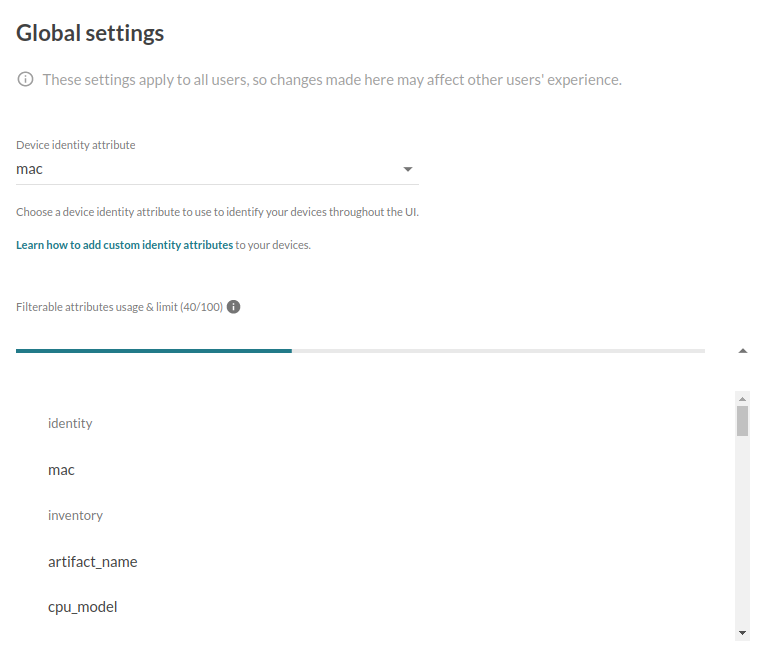Inventory
Introduction
Unlike Device identity attributes, Device inventory attributes do not need to be unique. They simply provide information about the target device.
The Mender Client will periodically collect inventory-related data for reporting to the Mender Server. Executable files, stored in a known location, will be invoked by the Mender Client, producing the inventory data as a set of key-value pairs.
When you log in to mender server UI and navigate to the device list, among other items, you can see certain pieces of data associated with each device. Those can be a hostname, IP address, or any key-value pair you can think of. For further details, please refer to the client installation section.
Usage
The Mender Server stores information about each device in the form of key-value pairs called attributes grouped in scopes. The inventory attributes belong to inventory scope which also denotes the ownership of data; the device "owns" the inventory data in a sense that it can overwrite the attributes in the scope at will.
Some considerations while working with inventory attributes:
- Inventory attributes are not unique identifiers of a device.
- Inventory attributes are pieces of data associated with a device that the client sends to the server for use in API calls or for sorting, filtering and searching in the UI.
- The client sends the attributes at regular intervals (configurable with InventoryPollIntervalSeconds).
- The server updates all attributes sent by the client.
The following screenshot shows an example set of inventory data in the expanded view of a device.

Inventory attribute use cases
The inventory attributes mechanism allows you to publish to the Mender Server every piece of data that is important for your usage and that can be expressed as key-value pairs. Later you can use these attributes to create filters, dynamic groups, and to search for devices.
Examples use cases:
- Information related to the installation of the device
- Site information
- Location information
- Project information
- Customer information
- IP address
- useful if you have VPN connections enabled, this could be a way to look up local IP address on the VPN network
Customizing Inventory
Adding more inventory fields, such as the kernel version or total available memory, is easy to do and Mender supports it well. Then you can use the inventory fields to create Dynamic groups (see the screenshot below).

For more information on customizing the Inventory attributes, please refer to the client configuration section.
Limitations
Each device can upload up to 100 inventory attributes in a single inventory update.
When indexing, the Mender Server considers up to 100 different inventory attributes' names uploaded by the devices. It will ignore all the additional inventory attributes' names. You can see the current usage and the list of filterable attributes in the Global settings.

If you reached the limit of filterable attributes, as you can see below:

but your use case requires a different set of attributes, please email contact@mender.io.
Currently, there is one "reserved" attribute in the identity scope: status.
It stores the status (accepted, rejected, etc.) of a device and changes whether
the device status changes. Therefore, you cannot modify it directly.
Inventory in the context of a System
When orchestrating updates across a System (see Orchestrate updates) it is important to distinguish between two distinct layers of inventory. First is the System device inventory, which is what is described above. Second is Component inventory which is the inventory of a specific Component. Component inventories provide granular details about Components such as firmware versions or hardware revisions.
Component inventory attributes are considered part of the System device inventory, and have the same format and constraints (see Inventory query, and Inventory).
All Component inventories are provided by the Components themselves using Inventory call in corresponding Interface, described in Interface Protocol and are not stored by the System device. The Component inventories are reported to the Mender Server by the System device as part of its inventory.